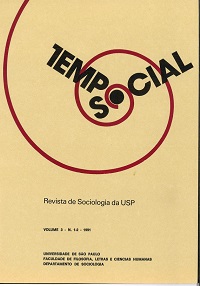Time and intellectual work
DOI:
https://doi.org/10.1590/ts.v3i1/2.84903Keywords:
Time, Linear time, Cyclical time, Productive temporality, Knowledge temporality, Modernization, USPAbstract
Why the generalised sensation of lack of time? Taking this question as its starting point, this article aims to explore some forms of temporality in modern society, in order to analyse the proper time of intellectual work: the temporal of knowledge, by assumption irreducible to the time-saying rationale of productivity. I shall begin with a discussion on the peculiar temporality of capitalist society: a linear, homogeneous and decomposed time as it is dominated by the a productivity imperative. I mention the importance of cyclical time, which capitalism did not abolish entirely, in order to introduce the specificity of intellectual work time-characterized by creation and chance. The research intends to explore how, in the work of the teachers´staff of the University of São Paulo, the problem of productivity rythms (brought by the modernization of the university) is faced in reference to the pace of the creation of knowledge.Downloads
Download data is not yet available.
Downloads
Published
1991-07-06
Issue
Section
Projeto de Pesquisa
License
Copyright (c) 1991 Tempo Social

This work is licensed under a Creative Commons Attribution-NonCommercial 4.0 International License.
How to Cite
Bruni, J. C. (1991). Time and intellectual work. Tempo Social, 3(1/2), 155-168. https://doi.org/10.1590/ts.v3i1/2.84903


